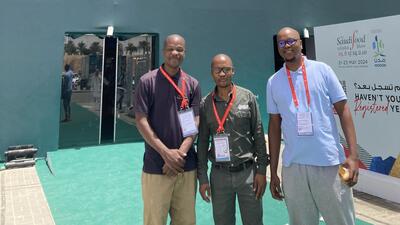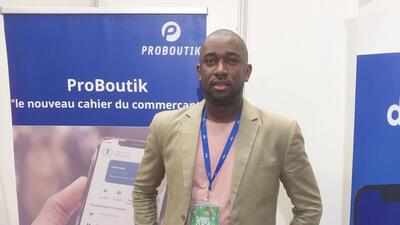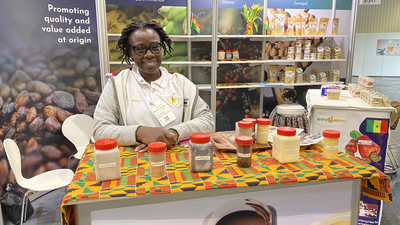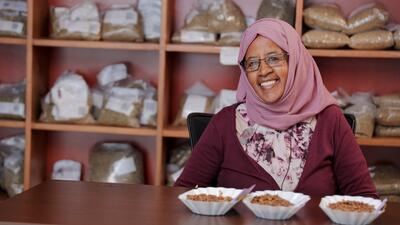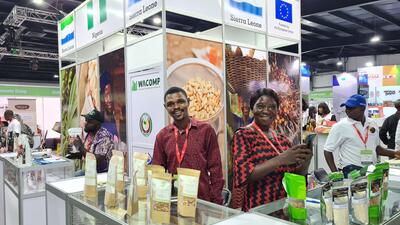



Young couple in Senegal turns farm waste into all-natural juice
Casadeliz is the brainchild of a young, entreprenurial couple in Senegal, Augustina Ephraim and Moulaye Biaye. They are turning the overlooked cashew apple into nutrient-rich and natural juices for the local market, with plans to scale up across Africa.
Casadeliz is on a mission to innovate sustainably while creating products made by Africans, for Africans. Their juice company, located in the heart of the Senegalese countryside, serves as a platform for rural development and showcases the potential of African ingenuity on a global stage.
Cashew apples are often discarded during harvest. But Casadeliz turns them into nutritious, flavor-packed juices. Fonders Moulaye Biaye and Augustina Ephraim are committed to environmental stewardship and the principles of circular economy.
‘Our brand was built on the observation that in African cashew production, 90% of it is cashew apple and just 10% is cashew nut,’ says Moulaye. ‘What do we do with the 90%? As a child growing up on the plantations, I always wondered why.’
He and his wife Augustina decided to harness the natural sweetness and nutritional profile of the cashew apple, offering a unique flavour. They are also exploring new avenues in the production of cosmetics made from cashew apples.
The young couple wants to boost Senegal’s sustainable development, creating jobs for rural youth and empowering their community.
Casadeliz is one of the brands working with the Netherlands Trust Fund V (NTFV) programme in Senegal’s cashew sector focused on sustainable agribusiness and business development through tech solutions. With ITC’s Alliances for Action initiative within NTFV, Casadeliz is leveraging programme support to scale up their business and marketing, and to explore new market linkages.
In September, they will participate in London’s Speciality and Fine Food Fair with NTFV to present their product to the European market.
From diaspora to entrepreneurship made in Senegal
Augustina, a chemical engineer from Ghana, and Moulaye, a former investment banker from Senegal, left their successful careers in France to return to Africa in 2019.
Cashew apple is classed as a ‘superfood’, packed with Vitamin C and calcium. The initial plan was to produce for European and American export markets, but they quickly realized the opportunity in the local market.
While their determination never waned, they found that entrepreneurship for youth in Africa is fraught with obstacles.
‘Access to finance is a huge issue for young entrepreneurs in Africa,’ says Moulaye. ‘The repayment periods are short, and the interest rates are extremely high. Access to electricity is also a problem, and it’s very expensive. Young African entrepreneurs need thick skin, resilience, and a strong belief that things will work out.’
Based in Senegal’s rural Casamance region, the couple quickly faced another challenge: Access to high-speed internet, highlighting the need for rural investment.
Motivated by social change, Moulaye and Augustina remain undeterred, and plan to expand to other African countries. ‘We hope that by doing this, we’ll motivate young people by way of our success. We want to demonstrate that rural entrepreneurship is possible and encourage people to settle in rural areas – or not to leave.’
Riding Senegal’s new generation health wave
In Senegal, the health and wellness trend is really taking off. Along Dakar’s beachfront, people young and old spend evenings jogging and working out in the free outdoor gyms.
Moulaye explains that young people, especially in the growing middle class, want healthy food options.
Casadeliz juice is non-GMO, vegan, gluten-free, and does not contain any artificial sweeteners or preservatives. When the brand started out, they tested two products: one had no additives, and the other was diluted with added sugar. The sugar-free version won every time.
‘We didn't realize that the market also exists here!’ says Moulaye. ‘Today our product is successfully sold in supermarkets like Carrefour and others, and also in service stations, which have a well-established national network. We’re developing a nationwide partnership to expand our coverage to the north of the country as well, for people to experience this unique product.’
Leveraging technology for better business
Through the NTFV programme, Casadeliz is exploring tech solutuions. Moulaye is a statistician by trade who understands the value of data. Augustina has a background in process engineering and is applying that knowledge to mainstream their production.
‘The technology is so advanced today that we can know upstream what is happening in down the production chain,’ says Moulaye. ‘Supply can be better optimized in production with technology. The more we use it, the more we optimize costs, and the better we manage our operations because we have a better overview.’
During a recent NTFV matchmaking session in Dakar, Casadeliz identified a digital marketing proposition to raise Senegalese consumers’ awareness of their product and its benefits.
About the projects
The Netherlands Trust Fund V (NTF) (July 2021 – June 2025) is based on a partnership between the Ministry of Foreign Affairs of The Netherlands and the International Trade Centre. The programme supports MSMEs in the digital technologies and agribusiness sectors. Its ambition is two-fold: to contribute to an inclusive and sustainable transformation of food systems, partially through digital solutions, and drive the internationalisation of tech start-ups and export of IT&BPO companies in selected Sub-Saharan African countries.
Alliances for Action is an ITC initiative that seeks to transform food systems through producer partnerships that cultivate ethical, climate- smart, sustainable agricultural value chains.






